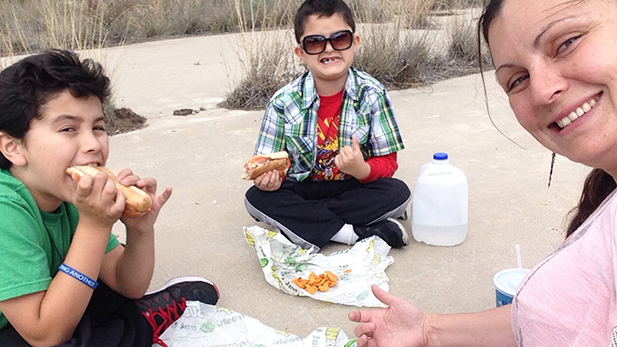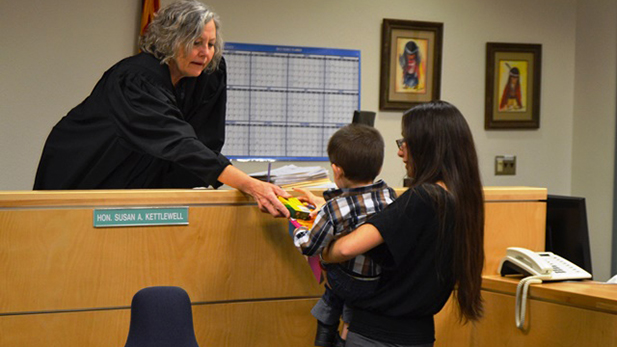 Mary Derrick was reunited with her sons after graduating from Family Drug Court.
Mary Derrick was reunited with her sons after graduating from Family Drug Court.Second of two parts, Hear the first part of this story here.
Mary Derrick is about to earn her master's degree in social work, an accomplishment under any circumstances.
Derrick's achievement may be even more impressive because she is a recovering drug addict whose two boys were taken from her by the state because of her drug use.
Her boys are teenagers now, and she has them back after years of struggle, including a successful recovery through the Pima County Family Drug Court.
The court, part of the county Juvenile Court system, succeeds in reuniting families at a rate double that of the group not going through the voluntary treatment and supervisory system. Its funding is threatened under proposed cuts to the Pima County justice system budget to help the county meet what is projected as a $23 million deficit.
Cuts would hurt those following Derrick and others on the long, difficult path to recovery and family reunification.
“Actually, three people from Family Drug Court came into my final dependency hearing to ask (that my case be closed)," Derrick said. "I was able to earn my B.A. of social work after interning with Family Drug Court for a year. In May I’ll earn my master of social work.”
Derrick's case was like every other child safety case in Pima County involving accusations of parental substance abuse. Parents must attend one session of Family Drug Court.
 Judge Susan Kettlewell of Pima County Family Drug Court hands a child a small gift.
Judge Susan Kettlewell of Pima County Family Drug Court hands a child a small gift.Then, joining the full rehabilitation program is voluntary. Of the parents who do join and graduate, 90 percent have their children returned.
The program's success is pegged to the county's financial commitment to it and to its use of recovered addicts as caseworkers and recovery specialists.
Linda Perry, a recovery specialist in the program and a recovering addict, said she sees addicted parents take notice when her background comes to light.
"It seems like every time they (parents) come in, there’s a lot of minimizing," Perry said. "They don’t want to talk about certain things, and I think there’s a huge change when they hear I have a history of substance abuse myself and I work for the court now.”
She said telling others about her own past changes the dynamic.
“That just breaks down the barriers, and right away I’ve noticed (when) I tell them a little bit of my story," Perry said. "All of a sudden it’s like 'yeah, I’ve done this and this,' and they start opening up and getting honest because they know we’re (the court employees) want to help."
There are three recovery support specialists in Family Drug Court, and unlike for many jobs, having experience with substance abuse is a benefit. Perry’s story is intense, but she said her past helps her understand what her clients are personally dealing with.
“I started out using drugs at a pretty early age, probably 14 years old," she said. "It progressed to a point where ... I was on the streets of downtown LA with a major cocaine addiction, literally sleeping under freeway bridges. Eventually it progressed to a heroin addiction as well. My life was completely out of control."
Derrick said having someone in the system who understood substance abuse made a huge difference to her.
“Thinking back to when I was new to recovery this time, just sitting around the table and having a heart to heart about our families, talking to the recovery support specialist about faith," she said. "It’s been (important) having that empathy."

By submitting your comments, you hereby give AZPM the right to post your comments and potentially use them in any other form of media operated by this institution.